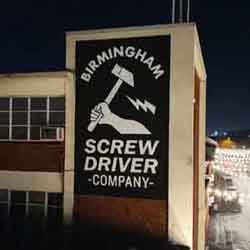


For the fastest restoration in the West see ![]() taken from 'The Car's The Star'.
taken from 'The Car's The Star'.
 I make a number of references to John Twist in these pages, he has had a long and honourable connection with MGs much of it with the MGB. For many years he has been making internet videos on technical matters and no less than 431 (and probably counting) can be found here.
I make a number of references to John Twist in these pages, he has had a long and honourable connection with MGs much of it with the MGB. For many years he has been making internet videos on technical matters and no less than 431 (and probably counting) can be found here.
Golden rules:
The reason for this is that if your spanner should happen to touch the body whilst it is also touching the earth/ground post of the battery nothing will happen. Once the earth/ground connection is removed and if you want to remove the battery it is now safe to undo the 12v (aka 'hot' or 'live') connection, because if your spanner should happen to touch the body while it is on the hot post still nothing will happen because the earth/ground connection has already been removed.
If you remove the 12v connection first and the spanner touches the body whilst doing so, you will generate a large spark which can ignite any battery gases that may be present, or maybe even cause the battery to explode in your face!
And finally the quote of quotes:
"Listen to the motor. Listen to the wheels. Listen with your ears and with your hands on the steering wheel; listen with the palm of your hand on the gearshift lever; listen with your feet on the floorboards. Listen to the pounding old jalopy with all your senses; for a change of tone, what a variation of rhythm might mean. That rattle - that's tappets. Don't hurt a bit. Tappets can rattle till Jesus comes again without no harm. But that thudding as the car moves along - can't hear that - just kind of feel it. Maybe oil isn't gettin' someplace. Maybe a bearing's startin' to go..."
The Grapes Of Wrath
John Steinbeck
It was near life and death for the people Steinbeck was writing about, but does it strike a chord?
February 2013: To bring things right up to date I came across this in a 2011 book about a 5000 mile solo ride through South Africa on a classic British bike by Steve Wilson - "Short Way Up". It was originally written by Peter Egan about bikes, but I think it applies equally well to our cars:
The information on these pages has been gleaned from the official factory Workshop Manual, Haynes, Clausager and others plus training and personal experience in electro-mechanical engineering and LBC ownership over many years. It is not intended to reproduce verbatim whole chunks of workshop manuals and other reference sources, more to pull together that wealth of knowledge and experience that comes from actually working on these cars, by others as well as myself, that is rarely in 'official' publications. Also to pull together information that may have been published elsewhere but in several different sources and/or times. E&OE. Which means 'Errors and Omissions Excepted'. Which means I have tried to make it accurate, but cannot be held responsible if it isn't, though do tell me of any errors. There is also no substitute for you owning the relevant manuals yourselves, have a look in my Virtual Bookshop.